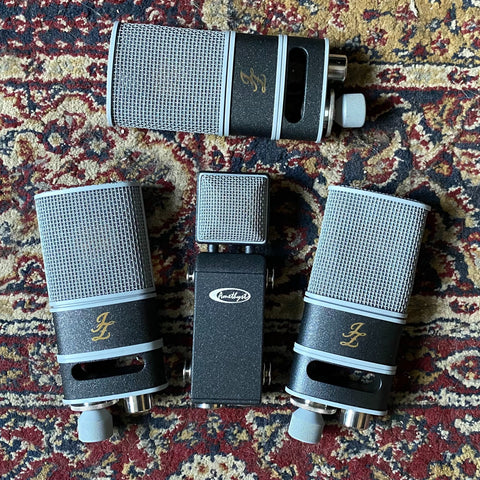You may have heard of the term ''mic locker'' before, but many don't understand the need for one, or its imperativeness within day to day sessions within studios all over the world.
So, today we'll discuss some real world examples and why professional engineers and producers love mic lockers and how you can build your own effectively.
Let's dive in.
Surely, one microphone is enough?
Quite simply, no. No, it's not. Well… ok it is IF you're podcasting, streaming, etc. something that basically only needs that one mic. For creatives like us, engineers and producers, it's simply not enough.
Let me break it down in the best way I can.
If you were a painter, you wouldn't only use one colour. And to argue that you could do art with only one colour is totally irrelevant as the canvas also has it's own colour, the brush you use has its own texture, and the person you are plays a huge part into how you paint that canvas.
The same applies to engineering, producing, etc. as we have many compressors and many EQ options for several sources depending on the sort of audible aesthetic we're after.
Enter the need for a mic locker. Several options for one source allow you to match the best microphone to capture said source immediately without the need to reshape or texturalize it later on will not only save you more time, but the timbre and texture of that sound will be much stronger in the mix because you had more than one mic to choose from.
What if I have one workhorse mic though?
That's absolutely fine, the Amethyst is that for myself but that should only be the case if you can reach for something else you know will better fit the source.
For example, it's easy for me to reach for that mic at any point because I'm familiar with the sound, but that's also super key: knowing the sound of each mic you have available.
Let's take a vocal mic shootout as an example:
My vocal needs something with more body, less top end, and slightly more neutral. I know this because I have more than one mic that I've tried on my vocals and found that a bright mic was too brittle, and the V67, or the Amethyst, or our new V12 was perfect. In fact, you could argue our darkest mic, the V11 would be perfect.
However, for my lead vocalist, Luc, something slightly righter to counter his baritone, such as the Black Hole Series, the V12 or the BB29 is perfect depending on the overall tonality of the song we're recording. The key thing and my point though, is that without more than one mic, I wouldn't have any other option than to just grin and bear through and try and make it work (which is never the vibe you want to have in a session!)
My personal collection of Modern sounding JZ Mic options
My collection of Vintage JZ mics options
To summarise, having more than just one option on any source, whether guitar or vocals, kick drum or a mono room - it will only benefit you.
My best advice if you're at the start of building your locker, aim for opposites and slowly fill the gaps over time; for example, if you have a V67 or Amethyst, either aim for something brighter like the Black Hole Series or the BB29, or go darker with the V47 or V11.
If you already have say a ribbon mic and a neutral mic like the V67, start to build your brighter mics so the options are there - the Black Hole Series will not only give you a brighter sound but also a more modern tonality, which only gives you more options by having them respectively rather than only having the vintage series for example, so the benefits only extend the more you grow your locker!


